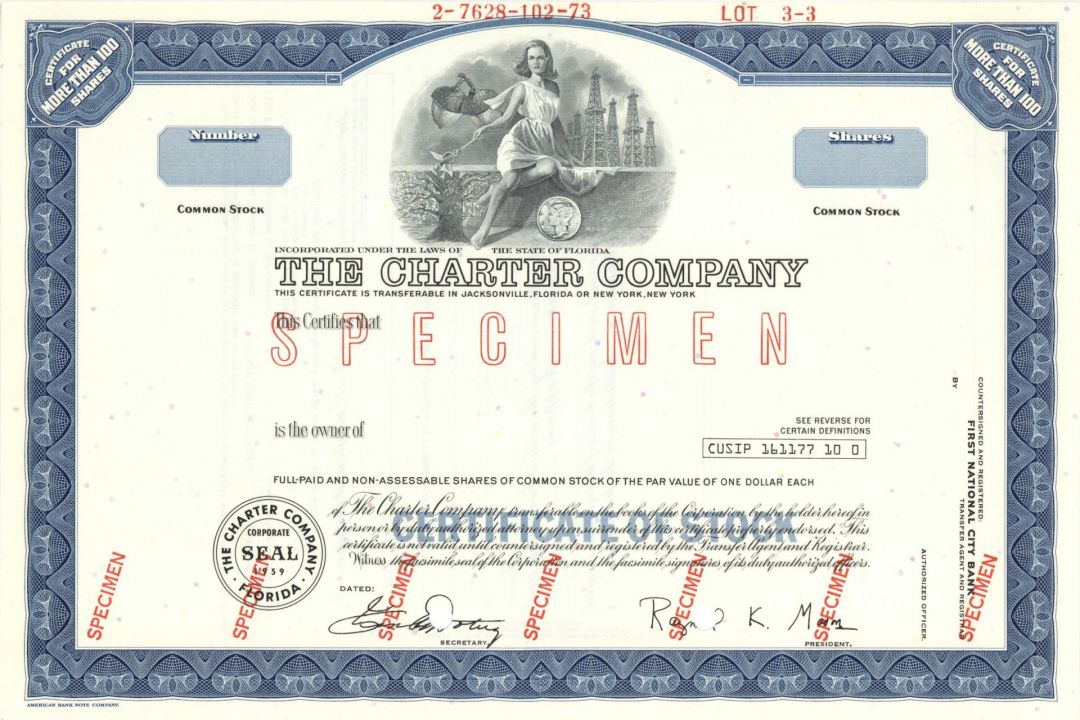Charter Co. - 1959 Specimen Stock Certificate
Inv# SE3729 Specimen StockSpecimen Stock printed by American Bank Note Company. Mercury dime in vignette!
The Charter Company of Jacksonville, Florida was a conglomerate with more than 180 subsidiaries that was in the Fortune 500 for 11 years beginning in 1974 and ranked 61st in 1984. The company filed for bankruptcy protection in late 1984, eventually selling off all of its businesses and purchasing Spelling Entertainment Inc. to form Spelling Entertainment Group Inc in 1992.
The Charter Company was started in Jacksonville, Florida, in 1949 by Jacksonville native, Raymond Knight Mason, who had just graduated from college. The company's roots were from the Mason Lumber Company, founded in 1919. Edward Ball, a powerful figure in Florida business and politics for decades, was Mason's friend and mentor. Ball worked for Alfred I. du Pont for nine years as a business associate before du Pont's death in 1935, then managed the Alfred I. duPont Testamentary Trust's assets for another 46 years. Charter started with a group of Florida mortgage, banking and land-developing firms. The corporate headquarters was located in the Universal-Marion Building at 21 West Church Street. The company then bought 60 small gas stations in 1968. In 1970, Charter purchased a petroleum operation for $70 million from the Signal Companies. Included in the deal was a small gasoline refinery in Houston, Texas, in need of updating, a string of gas stations in the Southeast and a handful of questionable tanker contracts. Four years later, when the 1973 oil crisis struck, Charter cashed in. Also in 1970, congress repealed an exemption which allowed charitable trusts to control banks, forcing the du Pont Trust to divest itself of the Florida National Bank Group, which Charter purchased. Charter also owned 8.4% of the St. Joe Paper Company, one of the largest assets in the du Pont Trust, while St. Joe owned 22% of Charter. The two companies exchanged shares in 1972 with the intention of merging. Senator Joseph Tydings was an investment partner in Charter since 1964 with $2 million in equity. At one time, Tydings was the largest Charter stockholder outside of the Mason family. A Life magazine article in 1970 suggested that the senator used his influence to assist Charter in business deals, but no laws were broken. In 1975, Charter purchased Redbook from Norton Simon Inc. In 1978, Charter acquired Downe Communications, the publisher of the Ladies' Home Journal. Charter had had a controlling stake in Downe for several years prior. The year before, Downe had acquired Bartell, the publisher of such magazines as Sport. Charter acknowledged that in 1978 and 1979, two of its oil executives had discussions with fugitive financier Robert Vesco; Mr. Vesco and Mr. Mason had business discussions as far back as 1971. Vesco was living in the Bahamas and had declined requests that he return to the U.S. to face charges that he swindled investors out of millions of dollars. The Senate Judiciary Committee was investigating connections between Billy Carter, brother of President Jimmy Carter, Vesco, and the country of Libya. Carey Energy Corporation, with $550 million in assets, was acquired by Charter in 1979 for $4 million is cash, $16 million in Charter convertible preferred stock and a consulting job for Edward M. Carey (brother of New York Governor Hugh Carey) paying $200,000 per year. Carey Energy's principal assets were a 65% ownership in a Bahamas refinery and the New England Petroleum Company, a fuel oil distributorship based in Brooklyn which sold the fuel produced by the refinery up and down the Atlantic coast. In 1980, Charter decided to buy Commonwealth Oil Refining Company and their Puerto Rican refinery, which processed 160,000 bbl (25,000 m3). per-day, for $650 million. The company also had plans to build a 100,000 bbl (16,000 m3) per-day refinery in Alaska to process the 75,000 bbl (11,900 m3) per-day of North Slope crude that they were promised. Read more at https://en.wikipedia.org/wiki/Charter_Company
Stock and Bond Specimens are made and usually retained by a printer as a record of the contract with a client, generally with manuscript contract notes such as the quantity printed. Specimens are sometimes produced for use by the printing company's sales team as examples of the firms products. These are usually marked "Specimen" and have no serial numbers.












Ebay ID: labarre_galleries